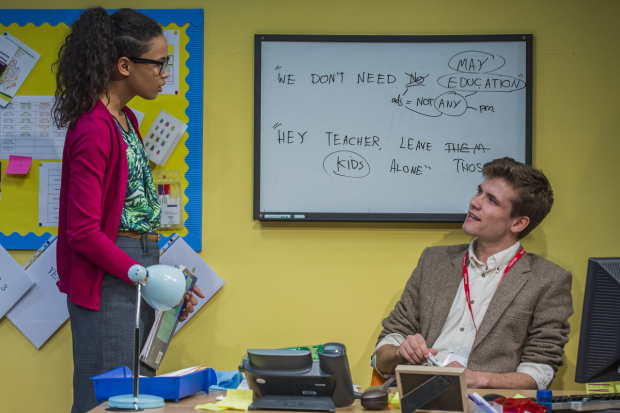School Play is an insight into a world many of us can only glimpse
School Play begins on 5 July 2017, when the SATs results of St Barnabas’ Primary School are released. The headteacher, Jo Fell, knows that these results will determine the school’s future as well as her own: over the course of one day her impulse to retain control brings her into conflict with her staff and superiors. As demands for answers and explanations grow, the fault lines of responsibility and accountability in our current education system are brutally exposed.
The landscape of British primary education is rarely explored on stage, but it demands our attention. It is impossible to answer what it’s like to be a primary teacher in the UK today; teachers are not a homogeneous mass, and answers will vary between schools, councils, catchment areas and year groups. School Play doesn’t so much answer that question as encourage it to be asked all the more vigorously, exploring the perspectives of educational practitioners at various stages of their careers.
Incoherent education policy is a dereliction of duty to teachers and pupils alike
Media coverage proclaiming an education system in crisis has become so prevalent that there is a real risk of normalising what is an unacceptable state of affairs. Teachers are tasked with often unmanageable workloads, growing class sizes, bureaucratic systems to record pupil data, progress and staff performance, and the overhaul of the National Curriculum and SATs testing (compounded with leaked test papers and a retroactively altered assessment system). The need to satisfy Ofsted inspectors is exacerbated by the implicit threat that any failing school can be converted into an academy by the Secretary of State. On top of this, the National Audit Office has announced that schools face eight per cent cuts in real terms by 2020.
There is a minatory and borderline aggressive posture mounted by those in government, one which refuses to trust teachers even as it limits the resources by which they can better innovate and nurture the pupils under their care. Now, more than ever, education deserves preservation, renewal and investment: empowering teachers, not cutting their funds, is a step towards those requirements.
Though a work of fiction, the play was shaped by teachers' testimonies and attitudes
Teaching is a vocation; every teacher interviewed in the research process of this piece has been engaged, enthusiastic and inventive under immense pressure. School administrative staff who gave time to offer guidance and consultation are likewise resolute in their commitment to their schools and pupils. Though a work of fiction, the play was shaped by their testimonies and attitudes.
Inconsistent and incoherent education policy is a dereliction of duty to teachers and pupils alike. School Play is a social realist insight into a world many of us can only glimpse, a story about a group of educational professionals who approach teaching from different stances but with the same intention: to better educate their pupils.
In their cultivation of sympathy, imagination, joy in the spoken and written word, primary education and theatre have much common ground. Antic Face’s production and their wonderful cast have crafted a show aligned with these values and in deep solidarity with teachers.
By Alex MacKeith
School Play runs at Southwark Playhouse until 25 February.











